Broadway Palm’s ‘Jesus Christ Superstar’ provides new slant on timeless musical
 On April 6, Andrew Lloyd Webber and Tim Rice’s first (and some think best) musical, Jesus Christ Superstar, opened on the main stage of the Broadway Palm Dinner Theatre. This particular
On April 6, Andrew Lloyd Webber and Tim Rice’s first (and some think best) musical, Jesus Christ Superstar, opened on the main stage of the Broadway Palm Dinner Theatre. This particular 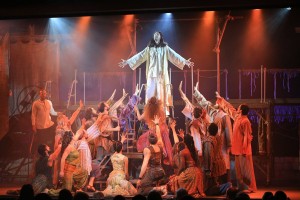 bears the imprint of director and choreographer Amy Marie McCleary in two distinctly profound ways.
bears the imprint of director and choreographer Amy Marie McCleary in two distinctly profound ways.
First and foremost, Jesus Christ Superstar (JCS) is a rock opera. Not only is the action non-stop, it is insanely intense. Thanks to McCleary’s careful, reverent, even inspired attention to both detail and big picture, her 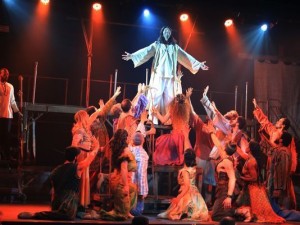 masterful choreography functions as a character that’s every bit as important as the set, costumes and the actors comprising this impossibly large cast of twenty-one.
masterful choreography functions as a character that’s every bit as important as the set, costumes and the actors comprising this impossibly large cast of twenty-one.
Each movement, each song and each dance number moves the story along its predetermined path, heightening the emotion and understanding of the passion unfolding on the stage. It’s an amazing feat, 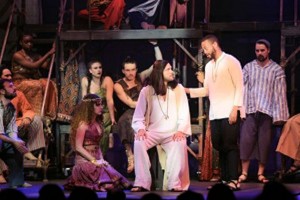 considering that at times the stage takes on the appearance of a traffic jam on the exit ramp connecting the 110 and 105 freeways in Los Angeles – but with rolling staircases substituting for sedans and SUVs. McCleary’s cast operates with the precision of a Swiss watch – or to complete the simile, the dancers in the opening scene of La La Land. The result is equally
considering that at times the stage takes on the appearance of a traffic jam on the exit ramp connecting the 110 and 105 freeways in Los Angeles – but with rolling staircases substituting for sedans and SUVs. McCleary’s cast operates with the precision of a Swiss watch – or to complete the simile, the dancers in the opening scene of La La Land. The result is equally  triumphant.
triumphant.
Even more compelling (if that’s possible) is the authenticity with which Jarrett Jay Yoder portrays the figure of Jesus Christ. The Jesus that Christians encounter in the gospels of Matthew, Mark, Luke and James is the Son of God. Totally aware of who  he is and the role he is to play in saving mankind from the grip of Adam and Eve’s sin, not even Satan can tempt him – not even after 40 days and 40 nights of fasting in the inhospitable confines of the Judean Desert. But the Jesus we meet on the Broadway Palm stage is more man than deity, both during the apogee of his fame in Act One and his nadir in Gethsemane and the courts of Herod and Pilate, not to mention on the road to Calvary.
he is and the role he is to play in saving mankind from the grip of Adam and Eve’s sin, not even Satan can tempt him – not even after 40 days and 40 nights of fasting in the inhospitable confines of the Judean Desert. But the Jesus we meet on the Broadway Palm stage is more man than deity, both during the apogee of his fame in Act One and his nadir in Gethsemane and the courts of Herod and Pilate, not to mention on the road to Calvary.
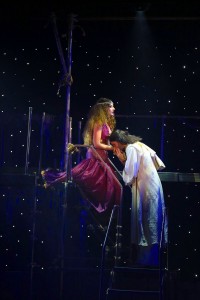 Webber-Rice-McCleary’s Jesus evinces all the frailties and foibles of ordinary human beings. His Cheshire Cat smile belies that he’s caught up in the adulation heaped upon him by his fawning apostles, heaven-on–their-mind disciples and adoring crowds. At times, he resents the masses. It is, after all, because of them that Jesus must die. “There will be poor always, pathetically struggling” he sings in “Everything’s Alright.” “Oh, there’s too little of me,” he laments in “The Temple,” where he adds almost sarcastically, “Don’t, don’t crowd me, please don’t crowd me, oh, heal yourselves.” And his love of Mary Magdalene is in danger of slipping from Platonic to physical with each kiss and delicate stroke of his hair. In fact, his defense of her seems more reminiscent of a lover than a sage. “I’m
Webber-Rice-McCleary’s Jesus evinces all the frailties and foibles of ordinary human beings. His Cheshire Cat smile belies that he’s caught up in the adulation heaped upon him by his fawning apostles, heaven-on–their-mind disciples and adoring crowds. At times, he resents the masses. It is, after all, because of them that Jesus must die. “There will be poor always, pathetically struggling” he sings in “Everything’s Alright.” “Oh, there’s too little of me,” he laments in “The Temple,” where he adds almost sarcastically, “Don’t, don’t crowd me, please don’t crowd me, oh, heal yourselves.” And his love of Mary Magdalene is in danger of slipping from Platonic to physical with each kiss and delicate stroke of his hair. In fact, his defense of her seems more reminiscent of a lover than a sage. “I’m  amazed that men like you can be so shallow, thick and slow. There is not a man among you who knows or cares if I come or go.”
amazed that men like you can be so shallow, thick and slow. There is not a man among you who knows or cares if I come or go.”
Under McCleary’s expert direction, Yoder deftly adds the facial expressions and body language that makes these human sentiments, emotions and reactions seem 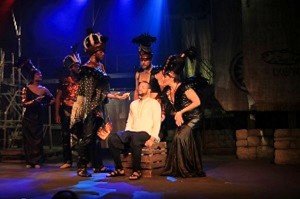 realistic, if not inescapable for the Son of Man.
realistic, if not inescapable for the Son of Man.
The way in which Yoder hunches and contorts his body in Act Two to evince fear, pain, misery and abandonment is even more impressive. And McCleary is to be commended for the authenticity she brings to the scene in which Jesus is scourged 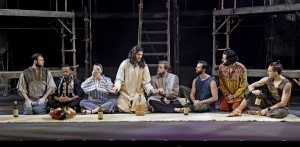 prior to his crucifixion. While not as graphic as Mel Gibson’s Passion of the Christ, it is bloody enough to convey the actual sacrifice Jesus made to save mankind.
prior to his crucifixion. While not as graphic as Mel Gibson’s Passion of the Christ, it is bloody enough to convey the actual sacrifice Jesus made to save mankind.
The net effect of humanizing the figure of Jesus is to make 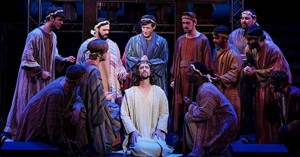 him seem more real and accessible not only to churchgoers, but nonbelievers as well.
him seem more real and accessible not only to churchgoers, but nonbelievers as well.
Of course, JCS is not just a rock opera, it is a musical extraordinaire. In this regard, it bears pointing out just how stellar the singing is throughout this performance, starting with Yoder.  He has a powerful voice with incredible range that allows him to hit and hold notes in the vibrato-less style popular with pop tunes like those included by Webber and Rice in this rock opera. He’s at his best in “The Temple” (where he chases away the money changers) and “Gethsemane (I Only Want to Say).”
He has a powerful voice with incredible range that allows him to hit and hold notes in the vibrato-less style popular with pop tunes like those included by Webber and Rice in this rock opera. He’s at his best in “The Temple” (where he chases away the money changers) and “Gethsemane (I Only Want to Say).”
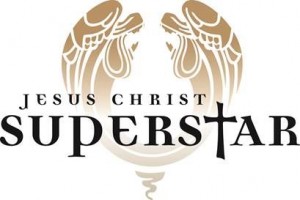 One of the aspects that makes JCS so unique is that the story of Jesus’ final days is told from the perspective of Judas Iscariot, who is played by Chasdan Ross Mike in the Broadway Palm production. Mike’s voice is even richer, deeper and more versatile than that of Jarrett Jay Yoder, and his renditions of “Heaven on Their Minds,” “Damned For All Time,” and “Superstar” are show stoppers in every sense of the term.
One of the aspects that makes JCS so unique is that the story of Jesus’ final days is told from the perspective of Judas Iscariot, who is played by Chasdan Ross Mike in the Broadway Palm production. Mike’s voice is even richer, deeper and more versatile than that of Jarrett Jay Yoder, and his renditions of “Heaven on Their Minds,” “Damned For All Time,” and “Superstar” are show stoppers in every sense of the term.
 the most evocative singer in this talented troupe is Ilana Gabrielle, who is tremendous as Mary Magdalene. Sweet and vulnerable, she lets us see how frightened and conflicted she is about her growing love of the man who claims to be the Son of God. Her version of “I Don’t Know How to Love Him” brought down the house on opening night, and garnered her the loudest applause when the performers took their bows to an enthusiastic and well-deserved standing ovation.
the most evocative singer in this talented troupe is Ilana Gabrielle, who is tremendous as Mary Magdalene. Sweet and vulnerable, she lets us see how frightened and conflicted she is about her growing love of the man who claims to be the Son of God. Her version of “I Don’t Know How to Love Him” brought down the house on opening night, and garnered her the loudest applause when the performers took their bows to an enthusiastic and well-deserved standing ovation.
 The King Herod Hollywood-style number was equally well-received for much different reasons.
The King Herod Hollywood-style number was equally well-received for much different reasons.
Broadway Palm’s production of Jesus Christ Superstar is a high-energy affair with a huge payoff for actors and audience alike. Even if you’ve seen JCS before, see it again. Amy Marie McCleary’s slant will give you an all new  appreciation of this timeless 40-year-old musical phenomenon.
appreciation of this timeless 40-year-old musical phenomenon.
April 13, 2017.
RELATED POSTS.














 Tom Hall is both an amateur artist and aspiring novelist who writes art quest thrillers. He is in the final stages of completing his debut novel titled "Art Detective," a story that fictionalizes the discovery of the fabled billion-dollar Impressionist collection of Parisian art dealer Josse Bernheim-Jeune, thought by many to have perished during World War II when the collection's hiding place, Castle de Rastignac in southern France, was destroyed by the Wehrmacht in reprisal for attacks made by members of the Resistance operating in the area. A former tax attorney, Tom holds a bachelor's degree as well as both a juris doctorate and masters of laws in taxation from the University of Florida. Tom lives in Estero, Florida with his fiancee, Connie, and their four cats.
Tom Hall is both an amateur artist and aspiring novelist who writes art quest thrillers. He is in the final stages of completing his debut novel titled "Art Detective," a story that fictionalizes the discovery of the fabled billion-dollar Impressionist collection of Parisian art dealer Josse Bernheim-Jeune, thought by many to have perished during World War II when the collection's hiding place, Castle de Rastignac in southern France, was destroyed by the Wehrmacht in reprisal for attacks made by members of the Resistance operating in the area. A former tax attorney, Tom holds a bachelor's degree as well as both a juris doctorate and masters of laws in taxation from the University of Florida. Tom lives in Estero, Florida with his fiancee, Connie, and their four cats.